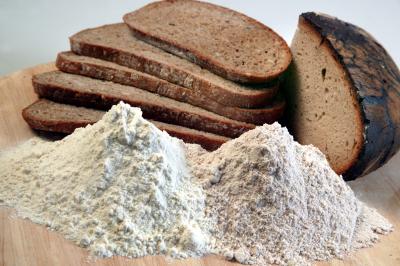Staying healthy is a tasteless job. Linseed is said to protect against cancer, for example, but not many people like the taste. Researchers have now isolated the valuable components of the flax seeds so when they are incorporated in bread, cakes or dressings, they support the human organism without leaving an unpleasant aftertaste.
Seriously? Cake that protects against cancer and noodles that lower cholesterol? Throw in cigars that clear our arteries and we'll join the health food bandwagon right now.
Research scientists at the Fraunhofer Institute for Process Engineering and Packaging IVV in Freising have isolated valuable components of linseed and lupin seeds and experimentally incorporated them in various foodstuffs: the linseed in cakes, bread, dressings and sauces, the lupins in bread, rolls and pasta.

We haven't tried them but they say the result is not only delicious, but healthy as well. Of course, they have to say that.
"Flax is not only high in soluble fiber, but also contains lignans. These substances are phytoestrogens, so they have a similar effect to that of the isoflavones that we know from soy beans. According to the literature, they protect the organism against hormone-dependent forms of cancer – that is, breast and prostate cancer," says IVV project manager Dr. Katrin Hasenkopf. "The lupins, on the other hand, contain substances that our studies have found to have a positive impact on the cholesterol level."
But how do the researchers isolate the valuable components? "We make use of the differing solubility of the various constituents: If the pH value is acidic, the unwanted bitter substances are the first to dissolve. If the pH value is then set back to neutral, you get the valuable proteins – without the bitter taste. We are also able to separate large components from small ones by a series of filtration steps," explains Hasenkopf.
Since the scientists are already skilled at isolating the valuable constituents, they now have to conduct further investigations with the aim of confirming the effects they hope to see.
"The healthy effects of linseed and lupin seeds are already known from literature, but so far there is a lack of conclusive scientific investigations on the subject. These substances undoubtedly have very high potential," says Hasenkopf.
The researchers will be presenting the linseed and lupin foods at the Biotechnica trade fair in Hannover on October 7 through 9 (Hall 9, Stand E29).
In about three years' time, the expert hopes, the new cholesterol-lowering foodstuffs will be available on supermarket shelves – maybe even including cakes, bread rolls and sauces enriched with the valuable substances obtained from flax seeds.





Comments